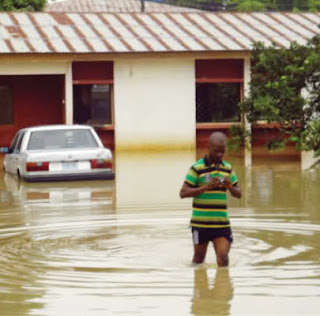Every year, water flood as a form natural disaster affects Nigeria, particularly its northern part, which swallows properties worth billions of Naira, washing away houses, displacing thousand of residents, markets, farmlands and cemeteries unearthing many corpses. The disaster render many affected people missing, costing hundreds of lives. This is mainly due to nonchalance of the residents and poor environmental policy from the government.
Flood in action
According to Director General of the National Emergency Management Agency (NEMA), 363 people died in flooding in Nigeria in 2012. 7 million people were affected and 2.3 million displaced after 597,476 houses were submerged by water. The country is still working to recover from the 2012 floods, which were considered to be the worst in 40 years. The following year, 2013, in Kano alone, the flood displaced over 500 people, killed one person after he fell in a River at Darmanawa in Kumbotso Local Government Area of the State. Four people were missing after they had been swept away by raging flood waters. The flooding also damaged the city cemetery, unearthing 20 corpses. The then Kano authorities claimed that at least 100 homes have been destroyed in the area, but Nigeria’s State Emergency Relief and Rehabilitation Agency (NEMA) gave a conflicting figure that 408 homes were destroyed in Kano city and another 26 outside the metropolis.
Last year, 2015, No fewer than 53 people have died in 11 states in the country resulting from flood disasters that displaced more than 100,420 persons.
The News Agency of Nigeria (NAN) report indicated that thousands of houses, farmlands and property worth billions of Naira were also lost to the flood disasters in many Local Government Areas affected in the northern states which were Kano, Katsina, Sokoto, Kebbi, Zamfara, Kaduna, Jigawa, Adamawa, Yobe, Gombe and Bauchi.
Many factors contribute to water flooding, more prominently are: building houses on waterways, narrowness of culverts and bridges dumping refuse at drainages and over filling of dams. At first, while locally segmenting land (awon igiya) done by traditional leaders and land dealers, out of either ignorance or bias or both, lands are segmented on waterways which is later sold to prospective buyers who will build on it thereby blocking smooth passage of water. Some times extension of houses also affect the waterways. In such a case, water, especially during heavy rain, will not get a passage and this will make it force its way. Some culverts and bridges are too narrow to let water move without hitches, in such an instance, water will force its way. Also the uncivilized way of dumping refuse everywhere, especially at drainages blocks the water passage which makes it force its way. When our dams are over filled, they over flow and force their ways. In all these instances highlighted above, the water having forced its way, move to the streets and stop traffic movement, killing people, washes away whatever it meets, which may be houses, farmlands, markets. Also it drowns people and make them missing and eventually kill them.
The solution is that, first of all, looking at the non-fulfilling nature of our most governments, to their promises, the society ought to develope communal project whereby they build drainages or expand them etc, with their gathered money. Government should embark on regular anti-flood campaign especially near and during rainy season. This campaign includes, jingles, posters, bill boards, sign boards, anti-flood films show on TV and projectors, radio dramas, leaflets, radio and television programs and advertorials. Prior warning of flood outbreak by meteorologists must be taken seriously by both the residents and the government. Our dams have to be well managed by their experts, so that they will not be over filled to overflow and kill people and destroy farmlands and other properties. Town planning and environmental workers/experts should be carried along and their suggestions should be duly implemented. Local land segmenting (awon igiya) should be outlawed, or made to conform with the best standard practice. Traditional and religious leaders must be involved. Laws have to be enacted to punish anybody who commits environmental offense capable of aiding flooding. The increasing use of polythene bag have to also be limited.
Therefore, unless the strong measures mentioned above are put in place, the devastating flood will continue to cost lives and properties on annual basis, unchecked. My hope is that this campaign will be well disseminated until it reaches the concerned authorities and of course my fellow masses whom I'm optimistic will be influenced by this piece.
(C) Bello Sagir Imam 2016.
08132518714/08057680032/belsagim@gmail.com
